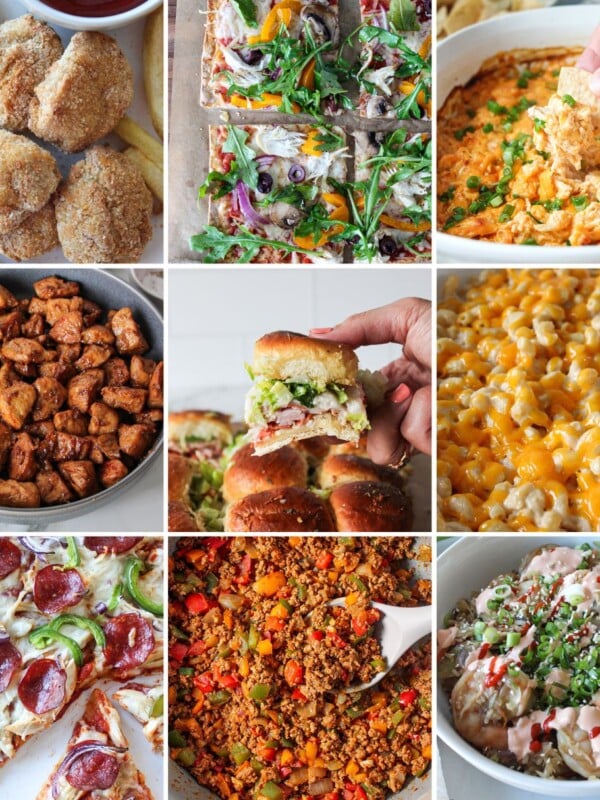This post may contain affiliate links. Please read our disclosure policy.
There are so many ideas out there about when we should eat, how much we should have, and what is best for us. But is one eating schedule really better than all the rest?
Today we’ll dive into what intermittent fasting is, its potential benefits, and where it can fall short.
Hi there, I’m Jamie, a Registered Dietitian! I help women feel confident with food, find their healthiest weight, and ditch the scale obsession. Want to know more about how I can help you? Check out my story!
Now – onto our topic of the day – how often should you eat?

Table of Contents
- How many times should you eat a day?
- Breakfast eating benefits
- What if I’m not hungry in the morning?
- Eat when you’re hungry, not starving
- Snacks to fill in the gaps
- What about intermittent fasting?
- Why do people intermittently fast?
- Does IF work for weight loss?
- Should I try intermittent fasting?
- Focus on sustainability
How many times should you eat a day?
Alright, back to the burning question: how many times should you eat every day?
I know you would love to hear “this is the magic number of meals you should eat every day for optimal health…”
I know I would! But the truth is, eating schedules don’t follow a one-size-fits-all approach.
What I can tell you is most of us feel and function best when we’re listening to hunger cues and eating consistently throughout the day!
A good guideline for how often you should eat is about every 3-4 hours.
This isn’t a hard set rule but is usually a great “check-in” time. For example, if you eat lunch at 12 and dinner at 6, you’ll probably need a well-balanced snack somewhere in between.
If you’ve been on and off diets repeatedly, your hunger cues might be subtle…or completely gone! If you’re not super in tune with your hunger cues, you may be able to go long periods of time without feeling hungry until it’s “too late” and you’re starving. These time frames can be helpful just to check in with yourself!
Regularly eating breakfast, lunch, and dinner is a great place to start. If you’re not hungry as soon as you roll out of bed, that’s okay! Breakfast doesn’t have to be eaten as soon as you wake up, but most people feel best if they eat breakfast before 10 am or so.
If you wait too long before eating, it can throw off your meal timing for the rest of the day, plus you might get too hungry by the time lunch rolls around.
Even if you’re not a big breakfast gal, here are a few reasons you might want to rethink skipping the meal that kick-starts your day.
Breakfast eating benefits
If your breakfast consists of a cup of black coffee, it might be time to rethink your morning routine! Here are a few reasons to consider kicking off your day with a nutritious breakfast.
Blood sugar boost
Did you know your blood sugar is usually low when you wake up in the morning? With low blood sugar, your brain and muscles don’t work as efficiently and you can find yourself dragging through the morning hours (1).
Steady fullness
By eating breakfast you set yourself up for stable hunger and feelings of fullness throughout the day. Have you ever waited too long to eat? Think of a time you browsed a restaurant menu feeling completely starved.
You probably ordered a big meal to fill the void in your belly and ate every last bite. Once the feeling of fullness set in you felt overfull and couldn’t believe you ate so much! Trust me you’re not alone there! When we wait too long between meals it’s easy to overeat when food is available.
Coffee doesn’t count
Although that steamy cup of caffeine pulls us out of bed in the morning, coffee is not breakfast and can actually throw off your morning hunger cues. Studies have shown the more coffee you drink, the smaller your appetite (2).
But your hunger cues can only be suppressed for so long. Eventually, hunger will strike and you may find yourself overeating to catch up.
What if I’m not hungry in the morning?
You may think that if you’re not hungry, you can just eat a balanced lunch and dinner and be fine.
Unfortunately, that may not be true. In a study with over 30,000 participants, researchers found that breakfast skippers were significantly less likely to meet these daily nutrient needs (3):
- Folate
- Calcium
- Iron
- Vitamins A, B1, B2, B3, C, & D
Think of breakfast as a tool to get the nutrients you need, rather than a meal you have to force yourself to eat! If you’re not a big breakfast eater, check in with yourself and ask yourself “If someone put a yummy breakfast in front of me right now, would I want to eat it?”
Eat when you’re hungry, not starving
Sticking to a regular eating schedule can teach your body what to expect every day. But remember you don’t have to be too rigid with the rules! When hunger cues come knockin’ you should eat!
Do your best to find something nutritious when you’re hungry, not when you’re starving. Waiting too long can actually lead to overeating and indulging in simple carbs – the kind found in pastries and desserts.
Even wonder why cookies and brownies sound better than a chicken salad when you’re hungry? Ghrelin’s the reason! This hormone motivates you to eat – but not just any food.
Ghrelin wants you to get food quickly when you’re starving, and the fastest-absorbed nutrient is simple carbohydrates (4).
By eating when you start to feel hunger, you’ll be able to make more mindful food choices to satisfy your cravings. Wait too long, and you’ll be under the spell of simple carb-seeking ghrelin!
Snacks to fill in the gaps
Eating three square meals a day works for some, but the stretch in between can feel pretty long. Balanced snacks can keep you satiated between meal times and prevent hunger from getting out of hand.
Balanced snacks are built with 2 or more food groups, like a protein and a carbohydrate source. (Think cheese cubes and a handful of grapes). By combining food groups, your body digests your snack more slowly and keeps you feeling full for longer.
(Psst: check out my full blog about building balanced snacks here: Balanced Snacks to Fuel your Health Goals (RD Approved!))
Snacking needs vary from person to person and there’s no one “right way” to eat. For example, someone who eats smaller meals may need more snacks than someone who eats larger meals.

What about intermittent fasting?
You may have heard of intermittent fasting (abbreviated IF) before and even wondered, “Should I try it?” Before we can answer that, let’s talk about what it is. Intermittent fasting is an eating pattern where you have a short “eating window” in which you are allowed to eat and drink whatever you’d like and then a longer “fasting window” where you are only allowed to drink water and other calorie-free drinks. There is no eating during the fasting period.
Intermittent fasting can be done in a few different ways. Here are three popular methods of fasting.
Daily intermittent fasting
People who fast this way eat for a set number of hours during the day and fast for the remainder of the day. The usual timeframes are eating for 6 hours and fasting for 18, or eating for 8 and fasting for 16.
5:2 intermittent fasting
The other form of fasting is eating normally 5 days a week and eating only a 500-600 calorie meal the other two days of the week (5).
Alternate-day fasting
This type of fasting allows you to eat normally one day and restrict calories to less than 500 the next day.
Why do people intermittently fast?
People choose to fast for different reasons, but the top of the list is weight loss (6).
Studies have shown some benefits to intermittent fasting including improved thinking and memory, healthier heart rates and blood pressure, decreased fat with maintained muscle mass, and weight loss in brief studies (7).
As a dietitian, I only want to recommend eating patterns that are sustainable long-term. This lifestyle may work for some but can be difficult to maintain. In one study, 38% of the participants required to intermittently fast dropped out of the trial without finishing (8).
Does IF work for weight loss?
Intermittent fasting is a weight loss strategy because you tend to eat less when you have a shorter window to eat in. This is a recipe for weight loss: eat fewer calories than you burn.
A calorie deficit is a goal with any diet plan, but with IF, instead of restricting what you eat, you restrict when you eat and how many calories.
Intermittent fasting can cause weight loss, but only if you stick with it and this pattern of eating isn’t always sustainable.
Overall, alternate-day intermittent fasting is equally as effective as traditional dieting for weight loss (9).
Should I try intermittent fasting?
Intermittent fasting is not sustainable for most people and it’s not a magic fix. Here are a few reasons intermittent fasting might not be the best strategy for weight loss:
- Fasting prompts you to ignore your hunger cues
- It’s not recommended for anyone with a history of disordered eating
- Research is still lacking in humans, especially women
- Studies haven’t shown it’s more effective than traditional lifestyle changes
- It does affect your enjoyment of eating and social eating
There are also side effects like hunger, fatigue, headaches, insomnia, and nausea especially when you start.
Focus on sustainability
The most important piece of any diet is sustainability. The biggest question you have to answer is can you stick with your lifestyle changes? To make a change stick, you have to like your new habits better than your old ones.
Ultimately, there are other ways to enjoy what you eat, on a flexible schedule, without worrying about tight restrictions or ignoring hunger cues!
Looking for a realistic, sustainable approach to eating? With my balanced approach, you’ll learn to feel confident with food and find your healthiest weight with this self-paced, supportive membership!













